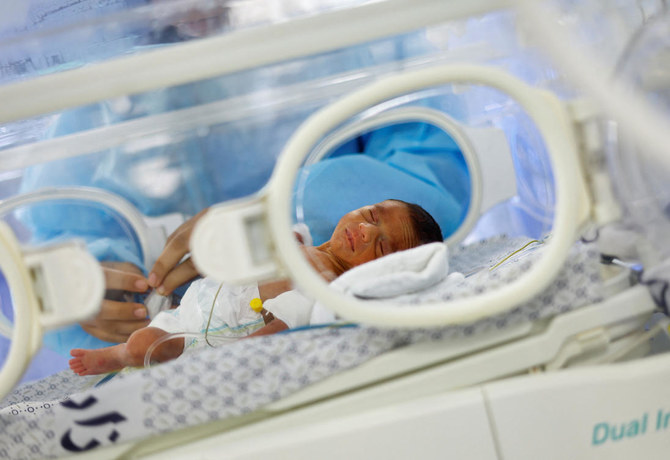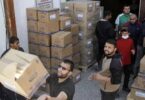KHAN YOUNIS (AP) : Gaza’s Health Ministry said at least 30 premature babies have been evacuated from Al-Shifa Hospital and will be transferred to hospitals in Egypt.
Medhat Abbas, a spokesman for the ministry, said they were evacuated from the hospital on Sunday.
A World Health Organization (WHO) team that visited Shifa Hospital on Saturday said 32 babies were among scores of critically ill patients stranded at the hospital, where Israeli forces have been operating since last week.
It was not immediately possible to resolve the discrepancy in the numbers.
A United Nations team said Sunday that 291 patients were left at Gaza’s largest hospital after Israeli troops had others evacuate. Those left included 32 babies in extremely critical condition, trauma patients with severely infected wounds and others with spinal injuries who are unable to move.
The team was able to tour Al-Shifa Hospital for an hour after about 2,500 displaced people, mobile patients and medical staff left the sprawling compound Saturday morning, said the WHO, which led the mission.
“Patients and health staff with whom they spoke were terrified for their safety and health, and pleaded for evacuation,” the agency said, describing Shifa as a death zone. It said more teams will attempt to reach Shifa in coming days to try to evacuate the patients to southern Gaza, where hospitals are also overwhelmed.
Israeli troops are staying in the hospital. Israel’s military has been searching Gaza City’s Shifa Hospital for a Hamas command center that it alleges is located under the facility — a claim Hamas and hospital staff deny.
Saturday’s mass departure was portrayed by Israel as voluntary, but described by some of those leaving as a forced exodus.
“We left at gunpoint,” Mahmoud Abu Auf told The Associated Press by phone after he and his family left the crowded hospital. “Tanks and snipers were everywhere inside and outside.” He said he saw Israeli troops detain three men.
Refugee camp struck
Elsewhere in northern Gaza, dozens of people were killed in the urban Jabaliya refugee camp when what witnesses described as an Israeli airstrike hit a crowded UN shelter in the main combat zone. It caused massive destruction in the camp’s Fakhoura school, said wounded survivors Ahmed Radwan and Yassin Sharif.
“The scenes were horrifying. Corpses of women and children were on the ground. Others were screaming for help,” Radwan said by phone. AP photos from a local hospital showed more than 20 bodies wrapped in bloodstained sheets.
The Israeli military, which had warned Jabaliya residents and others in a social media post in Arabic to leave, said only that its troops were active in the area “with the aim of hitting terrorists.” It rarely comments on individual strikes, saying only that it targets Hamas while trying to minimize civilian harm.
“Receiving horrifying images & footage of scores of people killed and injured in another UNRWA school sheltering thousands of displaced,” Philippe Lazzarini, the commissioner general of the UN agency for Palestinian refugees, or UNRWA, said on X, formerly Twitter.
Airstrike targets Khan Younis
In southern Gaza, an Israeli airstrike hit a residential building on the outskirts of the town of Khan Younis, killing at least 26 Palestinians, according to a doctor at the hospital where the bodies were taken.
Defense Minister Yoav Gallant said Israel’s forces have begun operating in eastern Gaza City while continuing its mission in western areas. “With every passing day, there are fewer places where Hamas terrorists can operate,” he said, adding that the militants would learn that in southern Gaza “in the coming days.”
His comments were the clearest indication yet that the military plans to expand its offensive to southern Gaza, where Israel had told Palestinian civilians to flee early in the war.
The evacuation zone is already crammed with displaced civilians, and it was not clear where they would go if the offensive moves closer.
What led to the Shifa Hospital evacuation wasn’t immediately known. Israel’s military said it was asked by the hospital’s director to help those who would like to leave do so, and that it did not order an evacuation. But Medhat Abbas, a spokesperson for the Health Ministry in Hamas-controlled Gaza, said the military ordered the facility cleared and gave the hospital an hour to get people out.
The UN team visiting after the evacuation said 25 medical staff remained, along with the patients. The WHO said that in the next 24–72 hours, pending guarantees of safe passage, more missions were being arranged to evacuate to the Nasser Medical Complex and the European Gaza Hospital in southern Gaza.
Twenty-five of Gaza’s hospitals aren’t functioning due to a lack of fuel, damage and other problems, and the other 11 are only partially operational, according to the World Health Organization.
Israel has said hospitals in northern Gaza were a key target of its ground offensive, claiming they were used as militant command centers and weapons depots, which both Hamas and medical staff deny.
Internet and phone services were restored Saturday to Gaza, ending a telecommunications outage that had forced the United Nations to shut down critical aid deliveries.
The war was triggered by Hamas’ Oct. 7 attack in southern Israel, in which militants killed about 1,200 people, mostly civilians, and abducted some 240 others. Fifty-two Israeli soldiers have been killed.
More than 11,500 Palestinians have been killed, according to Palestinian health authorities. Another 2,700 have been reported missing, believed buried under rubble. The count does not differentiate between civilians and combatants; Israel says it has killed thousands of militants.
Prime Minister Benjamin Netanyahu said Saturday that the Israeli military would have “full freedom” to operate within the territory after the war. The comments again put him in conflict with US visions for a post-war Gaza.
In an op-ed published Saturday in The Washington Post, United States President Joe Biden said Gaza and the West Bank should be reunited and governed under a “revitalized Palestinian Authority” while world leaders work toward a peaceful two-state solution. Netanyahu has long opposed a Palestinian state.
The US is providing weapons and intelligence support to Israel in its offensive to root out Hamas.
Growing Frustration
Gaza’s main power plant shut down early in the war, and Israel has cut off electricity. That makes fuel necessary to power generators needed to run water treatment plants, sanitation facilities, hospitals and other critical infrastructure for Gaza’s 2.3 million people.
UNRWA spokesperson Juliette Touma said 120,000 liters (31,700 gallons) of fuel arrived for the UN’s use, meant to last for two days, after Israel agreed to the shipment. Israel also is allowing 10,000 liters (2,642 gallons) to keep Internet and telephone systems running. It wasn’t immediately clear when UNRWA would resume aid that was put on hold Friday during the communications blackout.
Gaza has received only 10 percent of its required food supplies each day in shipments from Egypt, according to the UN, and the water system shutdown has left most of the population drinking contaminated water. Dehydration and malnutrition are growing, according to the UN’s World Food Program.
In Jerusalem, thousands of marchers — including family members and supporters of about 240 hostages held in Gaza by Hamas — arrived on the last leg of a five-day trek from Tel Aviv to plead with the government to do more to bring their loved ones home.
The Israeli military said its aircraft struck what it described as a hideout for militants in the urban refugee camp of Balata in the occupied West Bank. The Palestinian Red Crescent ambulance service said five Palestinians were killed. The deaths raised the number of Palestinians killed in the West Bank since the war began to 212.







